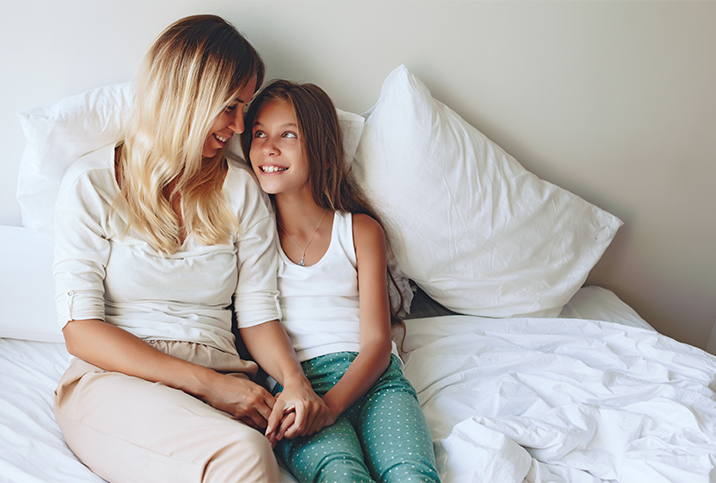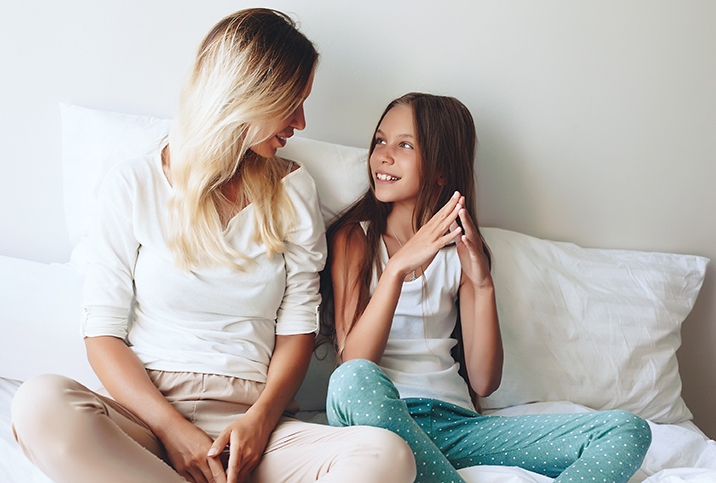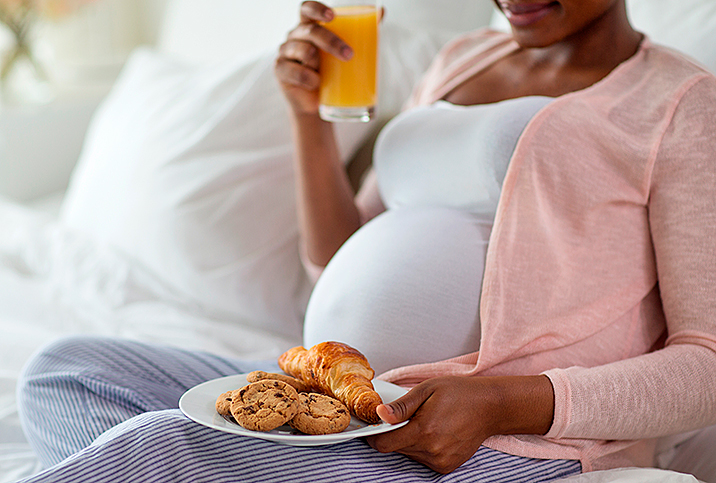Talking to Your Teen About Birth Control

Your teen might not have the best reaction if you tell them, "You should think about going on birth control" on a random Tuesday afternoon, but having that chat is nonetheless essential. Providing a safe and educational environment can encourage communication and openness about sexual health and safer sex practices that will keep your kid healthy not just now, but as an adult, too. Luckily, experts have tips on how to create that environment.
Start talking about birth control early on
"These conversations can begin as early as you would have conversations about puberty," said Rachel Miller, a licensed marriage and family therapist and the founder of Hold the Vision Therapy in Chicago. "Normalizing open discussions about birth control early will make it easier for everyone when your child needs support to obtain access to it."
This exchange doesn't have to be done with a one-time "birds and bees'' conversation. Try to incorporate it into normal parts of your life.
"I'm a big fan of finding everyday, casual openings for these conversations," Miller said. "Watch shows like 'Sex Education' on Netflix with your teens to open up dialogue. It's a brilliantly done show that covers almost every topic about sex you can imagine."
"Sex Education" isn't a specific requirement, but it may be a helpful tool to introduce these conversations in a more casual way so they're not as overwhelming.
It's not just about contraception
Despite what the name may imply, birth control has other uses aside from preventing unwanted pregnancy.
"Birth control can help manage symptoms of painful periods, heavy periods, as well as irregular cycles," said Iris Kerin Orbuch, M.D., from Beverly Hills, California. "It can help those with acne, as well. Long-term use of oral contraceptives have been found to decrease the risk of both ovarian and endometrial cancers."
Keep that in mind: Just because your teen has asked you if they can start birth control doesn't necessarily mean they are already having sex. It's possible they learned in school or through friends that birth control can help with acne and ease period cramps.
"Menstrual cramps and acne are aggravated by an imbalance of hormones," said Monica Grover, an OB-GYN and the chief medical officer for VSPOT, an intimate medspa in New York. "The contraceptives…restore hormonal balance and block prostaglandin production that creates inflammation and increases the intensity of contractions."
If your teen doesn't know these other uses, it's your responsibility as a parent to educate them about the potential benefits of birth control aside from preventing unwanted pregnancy.
Different kinds of birth control
Unless your teen has had extensive sex education, it's pretty likely they don't know there are different types of birth control. They—or even you—may think "birth control is birth control," but the reality is more complex.
The variety you, your child and your doctor may discuss includes birth control pills—those that have a combination of progesterone and estrogen and those that have only progesterone—intrauterine devices (IUDs), condoms, diaphragms, vaginal rings and birth control patches.
Listen to your teen
Your teen is your child, but they should still have a say over what happens to their body, including from a medical standpoint.
"Don't get pushy but ask genuine questions. If they don't want birth control, find out what their reasons are and take those seriously," Miller said. "Get answers to any questions they have and talk this through like you would any other medical decision."
These conversations should include a doctor or gynecologist who can provide unbiased medical advice, educate parents and teens alike on elements of birth control they may not be aware of and help mitigate side effects and risks.
Talk about the side effects
Speaking of which, if your teen is looking to start birth control, they should be prepared for those side effects.
"The risks with birth control include elevated blood pressure as well as blood clots," Orbuch said. "Birth control can worsen depression, as well. Some experience headaches, nausea, breast tenderness and alterations in mood."
Having a conversation with your teen around birth control might be awkward, but it's necessary. Hopefully, these tips will make the process a little more bearable for both you and your teen when that time comes.


















